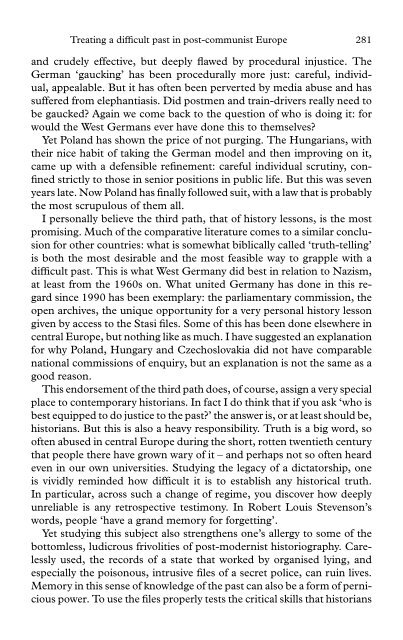Memory and Power in Post-War Europe: Studies in the Presence of ...
Memory and Power in Post-War Europe: Studies in the Presence of ...
Memory and Power in Post-War Europe: Studies in the Presence of ...
Create successful ePaper yourself
Turn your PDF publications into a flip-book with our unique Google optimized e-Paper software.
Treat<strong>in</strong>g a difficult past <strong>in</strong> post-communist <strong>Europe</strong> 281<br />
<strong>and</strong> crudely effective, but deeply flawed by procedural <strong>in</strong>justice. The<br />
German ‘gauck<strong>in</strong>g’ has been procedurally more just: careful, <strong>in</strong>dividual,<br />
appealable. But it has <strong>of</strong>ten been perverted by media abuse <strong>and</strong> has<br />
suffered from elephantiasis. Did postmen <strong>and</strong> tra<strong>in</strong>-drivers really need to<br />
be gaucked?Aga<strong>in</strong> we come back to <strong>the</strong> question <strong>of</strong> who is do<strong>in</strong>g it: for<br />
would <strong>the</strong> West Germans ever have done this to <strong>the</strong>mselves?<br />
Yet Pol<strong>and</strong> has shown <strong>the</strong> price <strong>of</strong> not purg<strong>in</strong>g. The Hungarians, with<br />
<strong>the</strong>ir nice habit <strong>of</strong> tak<strong>in</strong>g <strong>the</strong> German model <strong>and</strong> <strong>the</strong>n improv<strong>in</strong>g on it,<br />
came up with a defensible ref<strong>in</strong>ement: careful <strong>in</strong>dividual scrut<strong>in</strong>y, conf<strong>in</strong>ed<br />
strictly to those <strong>in</strong> senior positions <strong>in</strong> public life. But this was seven<br />
years late. Now Pol<strong>and</strong> has f<strong>in</strong>ally followed suit, with a law that is probably<br />
<strong>the</strong> most scrupulous <strong>of</strong> <strong>the</strong>m all.<br />
I personally believe <strong>the</strong> third path, that <strong>of</strong> history lessons, is <strong>the</strong> most<br />
promis<strong>in</strong>g. Much <strong>of</strong> <strong>the</strong> comparative literature comes to a similar conclusion<br />
for o<strong>the</strong>r countries: what is somewhat biblically called ‘truth-tell<strong>in</strong>g’<br />
is both <strong>the</strong> most desirable <strong>and</strong> <strong>the</strong> most feasible way to grapple with a<br />
difficult past. This is what West Germany did best <strong>in</strong> relation to Nazism,<br />
at least from <strong>the</strong> 1960s on. What united Germany has done <strong>in</strong> this regard<br />
s<strong>in</strong>ce 1990 has been exemplary: <strong>the</strong> parliamentary commission, <strong>the</strong><br />
open archives, <strong>the</strong> unique opportunity for a very personal history lesson<br />
given by access to <strong>the</strong> Stasi files. Some <strong>of</strong> this has been done elsewhere <strong>in</strong><br />
central <strong>Europe</strong>, but noth<strong>in</strong>g like as much. I have suggested an explanation<br />
for why Pol<strong>and</strong>, Hungary <strong>and</strong> Czechoslovakia did not have comparable<br />
national commissions <strong>of</strong> enquiry, but an explanation is not <strong>the</strong> same as a<br />
good reason.<br />
This endorsement <strong>of</strong> <strong>the</strong> third path does, <strong>of</strong> course, assign a very special<br />
place to contemporary historians. In fact I do th<strong>in</strong>k that if you ask ‘who is<br />
best equipped to do justice to <strong>the</strong> past?’ <strong>the</strong> answer is, or at least should be,<br />
historians. But this is also a heavy responsibility. Truth is a big word, so<br />
<strong>of</strong>ten abused <strong>in</strong> central <strong>Europe</strong> dur<strong>in</strong>g <strong>the</strong> short, rotten twentieth century<br />
that people <strong>the</strong>re have grown wary <strong>of</strong> it – <strong>and</strong> perhaps not so <strong>of</strong>ten heard<br />
even <strong>in</strong> our own universities. Study<strong>in</strong>g <strong>the</strong> legacy <strong>of</strong> a dictatorship, one<br />
is vividly rem<strong>in</strong>ded how difficult it is to establish any historical truth.<br />
In particular, across such a change <strong>of</strong> regime, you discover how deeply<br />
unreliable is any retrospective testimony. In Robert Louis Stevenson’s<br />
words, people ‘have a gr<strong>and</strong> memory for forgett<strong>in</strong>g’.<br />
Yet study<strong>in</strong>g this subject also streng<strong>the</strong>ns one’s allergy to some <strong>of</strong> <strong>the</strong><br />
bottomless, ludicrous frivolities <strong>of</strong> post-modernist historiography. Carelessly<br />
used, <strong>the</strong> records <strong>of</strong> a state that worked by organised ly<strong>in</strong>g, <strong>and</strong><br />
especially <strong>the</strong> poisonous, <strong>in</strong>trusive files <strong>of</strong> a secret police, can ru<strong>in</strong> lives.<br />
<strong>Memory</strong> <strong>in</strong> this sense <strong>of</strong> knowledge <strong>of</strong> <strong>the</strong> past can also be a form <strong>of</strong> pernicious<br />
power. To use <strong>the</strong> files properly tests <strong>the</strong> critical skills that historians
















